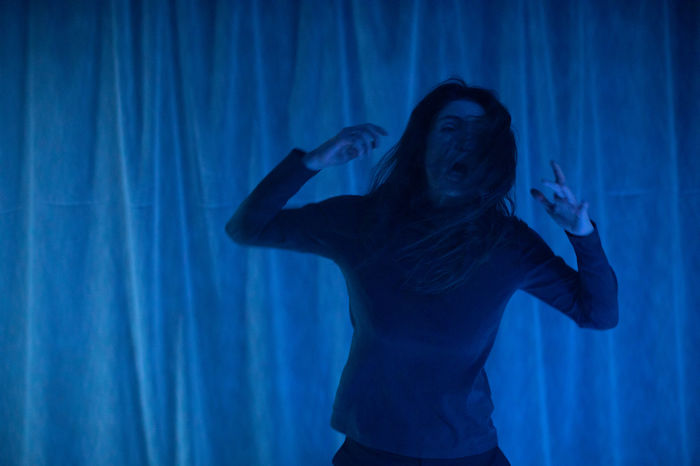Charlotte and Theodore: a backwards play for the modern day
Smart performances and design fail to rescue tired culture war ramblings

Have you ever sat in a room with a heterosexual white man whining and moaning about modern-day politics, followed by his self-proclamation as a victim of cancel culture? Charlotte and Theodore is a topical new play by Ryan Craig that charts the downfall of a charismatic, quick-witted male academic, whose equally quick-witted wife is offered his dream job. Yet, as attractive a set-up this is to today’s feminist audiences, Director Terry Johnson’s Charlotte and Theodore actually managed to sway audience sympathies against the “woke” generation, landing countless laughs about the ridiculousness of pronouns and accessibility from the leading man.
I opened my programme to a large note titled ‘Freedom of Speech,’ by Edith Hall, a professor of Classics at the University of Durham, who had pulled countless examples of censorship from the ancient world. While I can appreciate the poignancy of Julius Caesar’s proclamation that ‘War has no use for free speech’ in the modern day world of social media and global politics, to then watch the play suggest a woman’s success in academia is detrimental to free speech was not the revolutionary comment that I was expecting. Rather, the play dismissed every demographic group apart from the heterosexual white man.
I then sat in the audience utterly exacerbated and disappointed by a play where the primary conflict which drove the plot was a husband who couldn’t grapple with his wife’s success. We see Charlotte, a bright-eyed, astute assistant to Theodore, a well-established academic; she grows into a bold, independent woman while he shrinks into a comically ignorant and bitter man over a period of ten years.
“Unfortunately rendered as a comedy against strong women and progressive social politics”
Television favourite Kris Marshall plays the emasculated, spiteful straight man extremely well, and was almost too charming, as the audience laughed at his anti-feminist quips and remarks about inclusivity. Eve Ponsonby played Charlotte with remarkable energy and wit; she garnered my sympathy as a woman navigating a world in which men accuse her success of being a product of ‘culture wars’ instead of merit. Yet, throughout most of the play, the audience sat in sympathy with the shallow gripes at ‘cancel culture’ seemingly making a revolutionary comment on the hive mind of the woke generation (suggesting a ridiculous, Orwellian nature to being asked one’s pronouns) but instead creating another hive mind of ignorance. The play was, therefore, unfortunately rendered as a comedy against strong women and progressive social politics.
There is some credit due to the design elements of the play, however. The simplistic, grey industrial set was functional, assisting with on-stage costume changes, and acting as prop storage for scene changes, creating a suffocating space from which neither character escapes; both trapped within the discomfort that each other’s ideas bring. A simple use of projection indicated changes in setting and time period, as the play jumped between periods in their relationship. Moreover, clear plastic furniture functioned as a minimalistic yet extremely effective set, aiding an obnoxious discussion of Plato’s theory of forms.
Charlotte and Theodore makes many confused comments on progressive social politics and lands cheap laughs at the expense of non-binary people, people with disabilities, or women. It is a play that will inevitably exacerbate the existing generational tensions in modern day Britain, doing more to polarise than unite. It was performed in a way that painted a successful woman prioritising her career as the villain, suggesting her absence was detrimental to her children. The conclusion that I instead came to was that her husband was the inadequate flaw in their family unit. Perhaps the play’s moral message should have been a line that Charlotte has towards the end of the play: if she were a man, she would instead be congratulated. If the roles were reversed, the play wouldn’t even have a driving force, as male success is not an issue. Unfortunately, her character had already been painted as delusional and overly ambitious, so her closing comment on the patriarchy was lost among an audience who had been steered to shun her.
Charlotte and Theodore is showing at Cambridge Arts Theatre from Monday 27th March to Saturday 1st April.
 Comment / Plastic pubs: the problem with Cambridge alehouses 5 January 2026
Comment / Plastic pubs: the problem with Cambridge alehouses 5 January 2026 News / Cambridge businesses concerned infrastructure delays will hurt growth5 January 2026
News / Cambridge businesses concerned infrastructure delays will hurt growth5 January 2026 News / New movement ‘Cambridge is Chopped’ launched to fight against hate crime7 January 2026
News / New movement ‘Cambridge is Chopped’ launched to fight against hate crime7 January 2026 News / Uni-linked firms rank among Cambridgeshire’s largest7 January 2026
News / Uni-linked firms rank among Cambridgeshire’s largest7 January 2026 News / AstraZeneca sues for £32 million over faulty construction at Cambridge Campus31 December 2025
News / AstraZeneca sues for £32 million over faulty construction at Cambridge Campus31 December 2025









